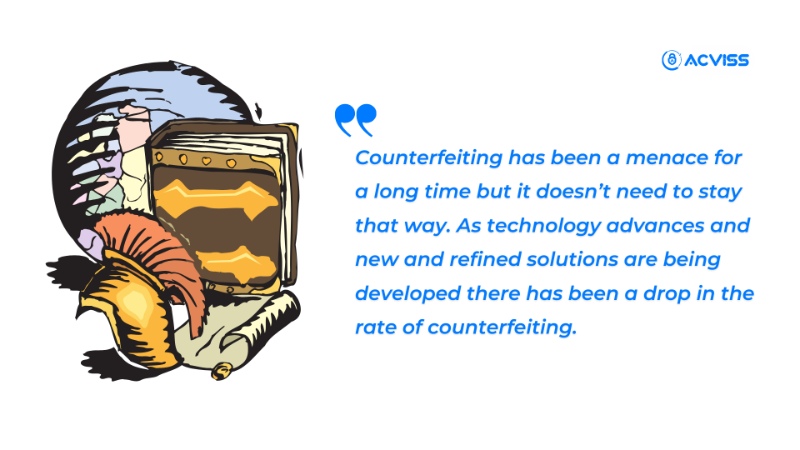Unveiling the greatest counterfeit scandals throughout the history

Denarii, the coins used in the Roman Empire during the period which stretched from 211 BC - 244 AD. These were the coins which have been recorded as one of the first products to be introduced to fourreés or imitations or in simpler terms Counterfeits. So, If you have thought counterfeiting is a modern world threat that was introduced by advancing technology, then you are dead wrong! Counterfeiting has been existing in this world for centuries, even the Roman, Persian, Greek and Macedonian Empires had their fair share of trouble with counterfeits and fraudsters.
But yes, technology has simplified the process for fraudsters to make it an existential threat. But with globalisation and advancement in technology, the border and barriers which was able to limit counterfeiting to an extent faded and opened a new window of opportunity.
Throughout history, there have been several famous cases of counterfeit products that have had significant impacts on society. And today we will explore some of the most notorious cases of counterfeit products throughout history.
The Great Tea Heist of 1773
Tea was a valuable commodity in the 18th century and also the most counterfeited product of the time. One of the most famous cases of counterfeit tea took place in Boston in 1773. During the colonial period, the British East India Company which ruled over many of the colonies were responsible for shipping tea from China, where they had the monopoly. However, smugglers bought cheaper dutch tea and sold it as legit British tea scamming the rich and poor alike. In order to put an end to it, the British government bought down the tax on tea, making it affordable to legally purchase it. But it wasn’t enough to prevent the counterfeiters. In response, a group of colonists, led by Samuel Adams, staged the Boston Tea Party, dumping 342 chests of tea into Boston Harbor to protest the monopoly on tea and the tax imposed by the British government.
The Tylenol Poisoning, 1982
Counterfeit in medicines has been the talk of the town, especially since the pandemic shook the world. But in 1982, the Tylenol poisoning had the world choking out of fear. Seven people in the Chicago area died after taking Extra Strength Tylenol capsules that had been laced with cyanide. The capsules were found to have been tampered with after they had been manufactured and distributed to stores. The incident led to a nationwide panic in the US and forced Johnson & Johnson, the maker of Tylenol, to recall over 31 million bottles of the drug, costing the company an estimated $100 million. The case has been cited as the best example of bringing stringent regulations in the pharmaceutical industry and monitoring supply chains.
The Shroud of Turin
Looking at the incidents above, it’s no surprise that the counterfeiters haven’t even spared the gods. The Shroud of Turin, a piece of cloth that is believed by some to be the burial shroud of Jesus Christ was revered across the world. However, the authenticity of the shroud has long been debated, with some claiming that it is a medieval forgery. In 1988, a team of scientists conducted radiocarbon dating on the shroud and determined that it dated from the 13th or 14th century, suggesting that it was indeed a forgery. And there have been thorough studies and inspections conducted regularly till now and scientific evidence still points it to be artificial even though many believers still stick to the idea of it being real.
The Silk Road and Ulbricht
The infamous online black market website, Silk Road conducted its illegal business on the dark web. They sold everything from weapons and drugs to counterfeit clothes and CDs. Their transactions were conducted over bitcoins which could keep the users anonymous. But in 2013, the FBI shut down the website and arrested Ross Ulbricht, the founder. He was sentenced to two life sentences on various charges including money laundering and drug trafficking. It was valued that around $15 million worth of goods were sold annually through the website. The majority were drugs and counterfeit products and documents such as passports, licenses and certificates.
The Great Wine Fraud
The wine industry saw some of the worst counterfeit busts in the near past and Rudy Kurniawan has left a severe mark on it. He was a wine collector and dealer who made millions of dollars selling rare and expensive wines to wealthy collectors in the early 2000s. However, it was later discovered that many of the wines he sold were fakes, created by blending cheaper wines with chemicals and additives to mimic the taste of more expensive vintages. Kurniawan was eventually arrested and sentenced to 10 years in prison for wine fraud.
Brazil’s Operation Weak Flesh
One of the biggest meat scandals happened in Brazil, the powerhouse of beef and poultry meat. The Brazilian authorities launched Operation Weak Flesh to investigate the widespread corruption which was allowing companies to sell and export rotten meat across the world. The investigation was conducted on dozens of companies including JBS and BRF which were found to be selling low-quality and expired meat. The scandal had a huge impact on the Brazilian economy. The meat industry was making $60 million per day which plummeted down to $74,000 as most countries stopped importing meat from Brazil and the scandal had led to a global food safety scare.
The Scandal of Baby Formula in China
China has been a hub for counterfeits for a long time. But it took the center stage when 300,000 children were poisoned using baby formula. In 2008, it was discovered that baby formula produced by a Chinese company had been contaminated with melamine, a toxic chemical used in the production of plastics. The contamination led to the deaths of six infants and caused thousands of others to become ill. The incident led to widespread outrage and calls for better regulation of the Chinese food industry. It was then found out that most baby food companies used similar chemicals in their products, which caused widespread distrust among parents who had to rely on foreign brands to feed their children.
The Fipronil Egg, 2017
Never could have imagined that eggs could be counterfeited, but in 2017 a scandal in Europe made people think twice about it. An investigation conducted on the eggs from the farms of the Netherlands and Belgium found that they had been contaminated with fipronil, an insecticide that is restricted and not authorized to be used in the production of food. The major threat was that these eggs have been exported to countries like Germany, France and the UK. The revelations led to the removal of millions of eggs from supermarkets and other stores and several markets across the countries putting a ban on selling the eggs bought from these farms.
Drug busts and Operation Pangea XIV

An international operation started by Interpol swept the global market to eliminate counterfeit products and medicine sold online and offline. With members from 92 countries, they were able to track down more than 100,000 web links and captured around $23 million worth of fake drugs. Since the Covid pandemic disrupted the entire supply chain across the world, pharma products became high in demand which paved the way for counterfeiters to make some quick money. This has turned out to be one of the most significant drug busts that have shaken the world in recent times.
So in short,
Counterfeiting has been a menace for a long time but it doesn’t need to stay that way. As technology advances and new and refined solutions are being developed there has been a drop in the rate of counterfeiting. Various anti-counterfeit measures including the use of secure packaging and proprietary labelling, holograms and QR codes help customers verify the authenticity of the products they purchase and avoid falling victim to counterfeiters. But it is incomplete without the support of the consumers themselves. Being aware of the counterfeits and making the choice not to promote them is the first step we need to take towards building a fake-proof world. So you don’t have to go further looking for a solution, make the right decision today so you won’t have to worry tomorrow.